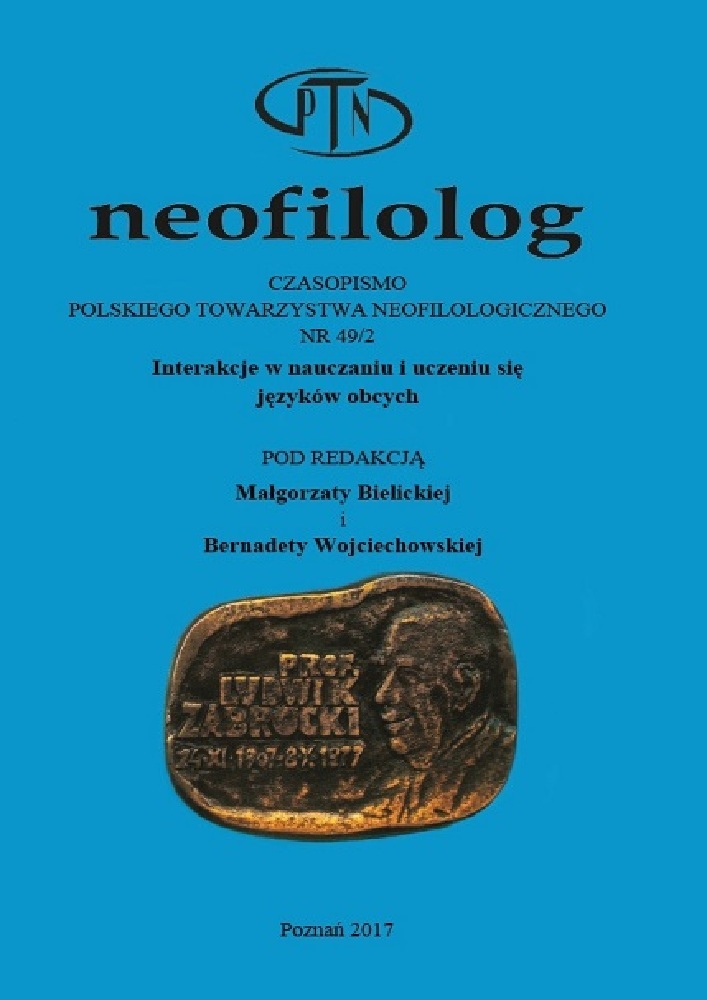Abstract
The contemporary learning culture perceives learners as active and aware participants in the learning process. This implies a new understanding of interactions in the classroom. The present paper is focused on feedback as a special type of teacher-learner interaction and its potential for cognitive activation of learners and constructive enhancement of individual learning processes. Feedback which activates learners and increases the amount of the input and output in the foreign language is able to enhance students` communicative language competence. The article discusses the changing role of feedback referring to the current state of research.References
Arnold, R., Schüßler, I. 1998. Wandel der Lernkulturen. Ideen und Bausteine für ein lebendiges Lernen. Darmstadt: Wissenschaftliche Buchgesellschaft.
Coste, D., North, B., Sheils, J., Trim, J. 2001. Gemeinsamer europäischer Referenzrahmen für Sprachen: Lernen, lehren, beurteilen. http://www.goethe.de/Z/50/commeuro/i2.htm [DW = 15.03.2017]
De Corte, E. 2013. „Historyczny rozwój myślenia o uczeniu się”. (in) Istota uczenia się. Wykorzystanie wyników badań w praktyce. (Hrsg. H. Dumont, , D. Istance, F. Benavides,), Warszawa: Wolters Kluwers Polska S.A., S. 60-108
Dörnyei, Z. 2001. Motivational strategies in the language classroom. Cambridge: Cambridge University Press.
Edmondson, W., House, J. 2003. „Interaktionen beim Lehren und Lernen fremder Sprachen“. (in) Handbuch Fremdsprachenunterricht (Hrsg. K.-R., Bausch, H. Christ, H. J. Krumm). Tübingen und Basel: A. Francke Verlag, S. 242-247.
Gass, S. 2003. „Input and interaction”. (in) The handbook of second language acquisition. (Hrsg. Doughty, C. J., Long, M. H.).Malden: Blackwell Publishing, S. 225-255.
Gold, A. 2015. Guter Unterricht. Was wir wirklich darüber wissen. Göttingen: Vandenhoeck & Ruprecht.
Hattie, J. 2015. Widoczne uczenie się dla nauczycieli. Jak maksymalizować siłę oddziaływania na uczenie się. Warszawa: Centrum Edukacji Obywatelskiej.
Hattie, J., Timperley, H. 2007. „The power of feedback”. Review of Educational Research 1(77): 81-112. https://ctl.univie.ac.at/fileadmin/user_upload/z_ctl/Feedback/Hattie_Timperley_2007_Power_of_Feedback_1_.pdf [DW = 18.03.2017]
Helmke, T., Helmke, A., Schrader, F.-W., Wagner, W., Nold, G., Schröder, K. 2008. „Die Videostudie des Englischunterrichts“. (in) DESI-Konsortium. Unterricht und Kompetenzerwerb in Deutsch und Englisch. Ergebnisse der DESI-Studie. Weinheim und Basel: Beltz Verlag. S. 345-363. http://www.pedocs.de/volltexte/2013/3521/pdf/Helmke_Helmke_Schrader_Videostudie_2008.pdf [DW = 15.03.2017]
Hüther, G. 2016. Mit Freude lernen ein Leben lang. Göttingen: Vandenhoeck & Ruprecht.
Janicka, M. 2013. „Preferencje dotyczące korekty błędów językowych w wypowiedziach ustnych na tle dyskursu pedagogicznego w klasie językowej”. (in) Rola dyskursu edukacyjnego w uczeniu się i nauczaniu języka obcego. (Hrsg. M. Pawlak), Kalisz – Poznań: Wydział Pedagogiczno-Artystyczny UAM, Uniwersytet A. Mickiewicza. S. 261-281.
Kleppin, K. 2000. Fehler und Fehlerkorrektur. Berlin, München, Leipzig, Wien, Zürich, New York: Langenscheidt.
Königs, F. 2003. „Fehlerkorrektur“. (in) Handbuch Fremdsprachenunterricht. (Hrsg.) K.-R. Bausch, , H. Christ, H.-J. Krumm, Tübingen und Basel: A. Francke Verlag, S. 377-382.
Majer, J. 2003. Interactive discourse in the foreign language classroom. Łódź: Wydawnictwo Uniwersytetu Łódzkiego.
Marzec-Stawiarska, M. 2013. „Analiza lęku przed mówieniem w języku obcym jako element odpowiedniego zarządzania dyskursem w klasie”. (in) Rola dyskursu edukacyjnego w uczeniu się i nauczaniu języka obcego. (Hrsg. M. Pawlak), Kalisz – Poznań: Wydział Pedagogiczno-Artystyczny UAM, Uniwersytet A. Mickiewicza. S. 47-68.
Reich, K. 2004. Konstruktivistische Didaktik. Lehren und Lernen aus interaktionistischer Sicht. München/ Unterschleißheim: Luchterhand.
Język angielski w gimnazjum. Raport cząstkowy z pierwszego etapu Badania uczenia się i nauczania języka angielskiego w gimnazjum. 2014. Warszawa: Instytut Badań Edukacyjnych.
http://eduentuzjasci.pl/badania/110-badanie/572.html [DW = 18.03.2017]
Siebert, H. 2005. Pädagogischer Konstruktivismus. Lernzentrierte Pädagogik in Schule und Erwachsenenbildung. Weinheim und Basel: Beltz Verlag.
Volkwein, K. 2012. „Sich wechselseitig bewerten“. Pädagogik 2/12: 20-23.
License
Copyright (c) 2017 Monika Janicka

This work is licensed under a Creative Commons Attribution-NoDerivatives 4.0 International License.
Authors
Authors of texts accepted for publication in Neofilolog are required to complete, sign and return to the Editorial team’s office the Agreement for granting a royalty-free license to works with a commitment to grant a CC sub-license.
Under the agreement, the authors of the texts published in Neofilolog grant Adam Mickiewicz University in Poznań a non-exclusive, royalty-free license and authorize the use of Attribution-NoDerivatives 4.0 International (CC BY-ND 4.0) Creative Commons sub-license.
The authors retain the right to the free disposal of the work.
Users
Interested Internet users are entitled to use works that have been published in Neofilolog since 2017, under the following conditions:
▪ attribution – obligation to provide, together with the distributed work, information about the authorship, title, source (link to the original work, DOI) and the license itself.
▪ no derivatives – the work must be preserved in its original form. Without the author's consent, it is not possible to distribute the modified work in the form of translations, publications, etc.
Copyrights are reserved for all texts published since 2017.
Miscellaneous
Adam Mickiewicz University in Poznań retains the property right as a whole (layout, graphic form, title, cover design, logo etc.).
